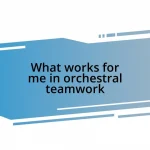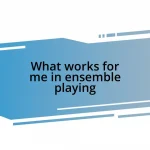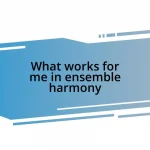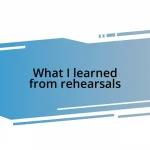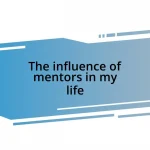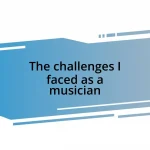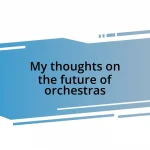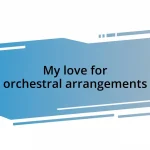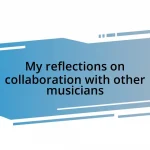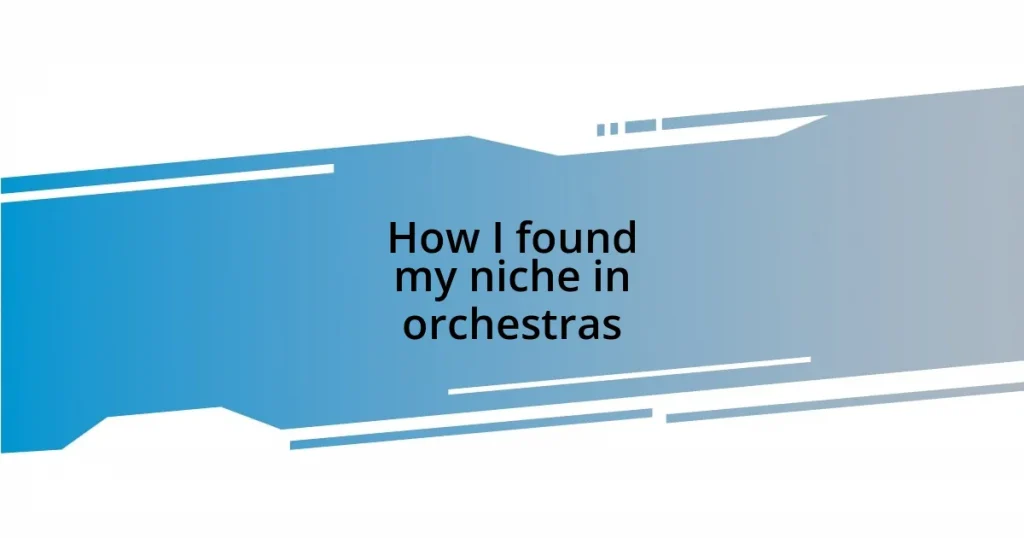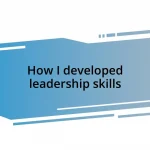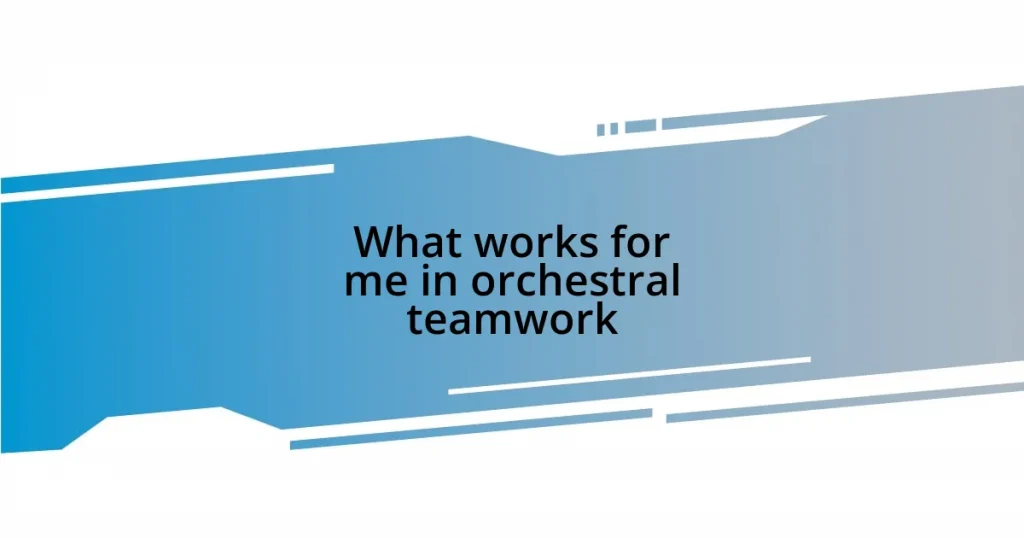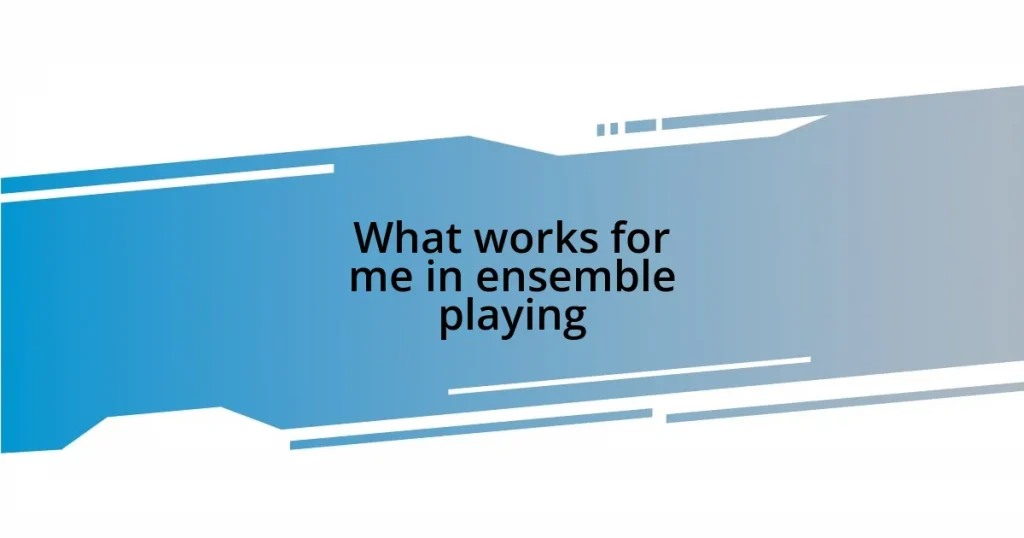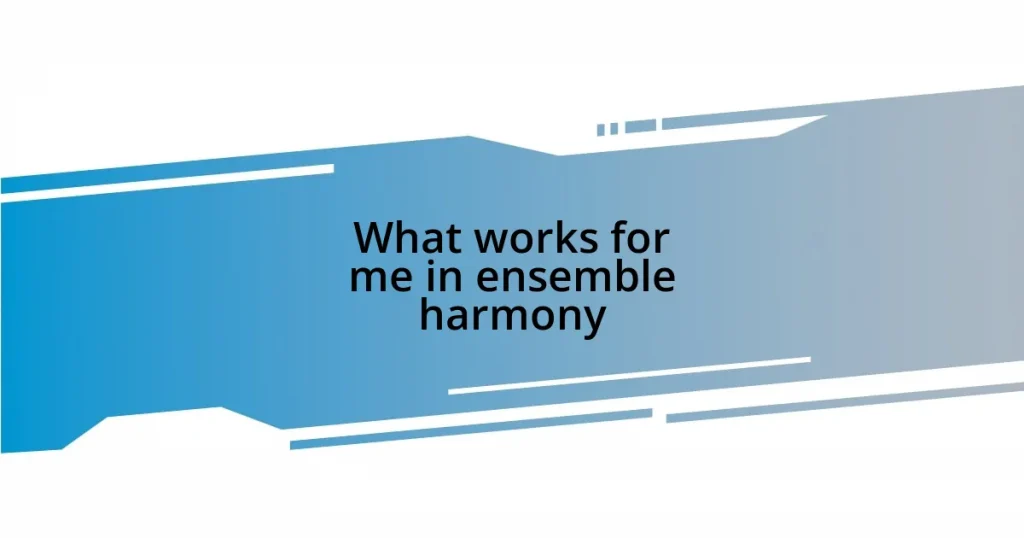Key takeaways:
- Understanding your musical identity involves exploring different genres and embracing both strengths and vulnerabilities to define who you are as a musician.
- Exploring various orchestral roles enhances adaptability and collaboration, demonstrating the importance of every musician’s contribution to the overall sound.
- Networking with musicians leads to enriching connections and opportunities, emphasizing the value of building relationships grounded in shared passion.
- Gaining experience through auditions fosters resilience and personal growth, highlighting that every audition contributes to the musician’s journey, regardless of the outcome.
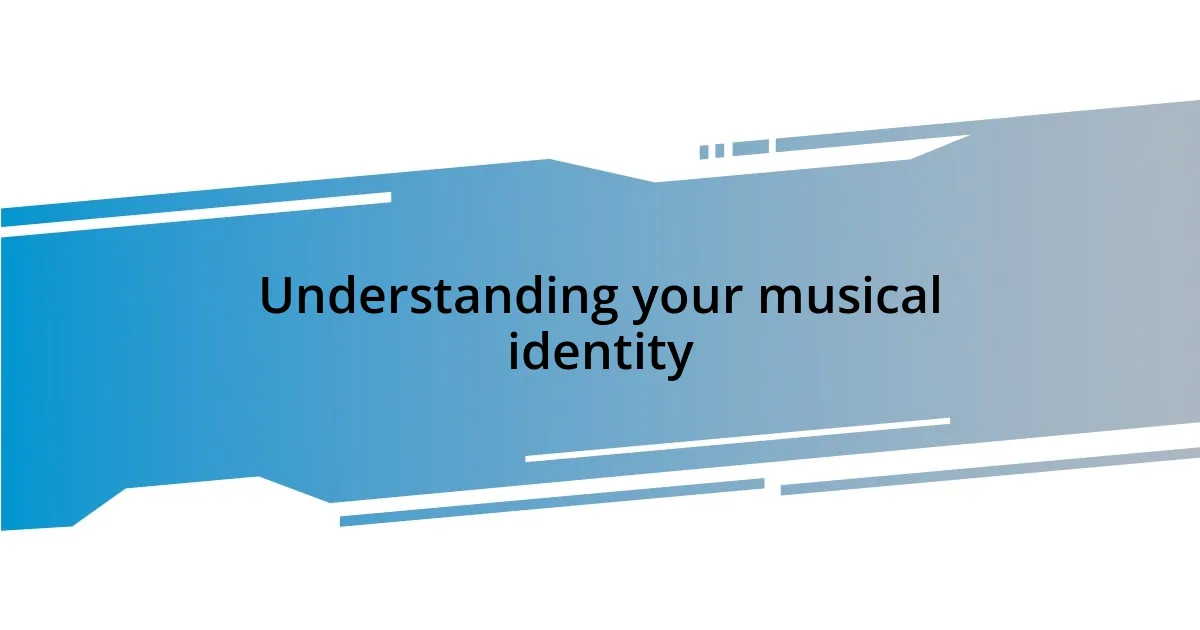
Understanding your musical identity
Understanding your musical identity is an ongoing journey of discovery. I remember a moment when I was playing in a community orchestra, surrounded by talented musicians, and I felt a deep connection to the music we were creating. Have you ever experienced that electrifying moment when a particular piece resonates with you on a personal level? It can be transformative, helping to clarify who you are as a musician.
As I immersed myself in various musical styles, I began to notice what truly excited me and sparked joy in my playing. Exploring different genres revealed layers of my musical self that I hadn’t recognized before. For instance, I once tried my hand at jazz improvisation, and the freedom of expression was exhilarating! How do you feel when you step outside your comfort zone musically?
Through these experiences, I realized that understanding your musical identity is about embracing both strengths and vulnerabilities. It’s the delicate balance of acknowledging what you love while remaining open to growth and exploration. There were times I felt lost, unsure of my direction, but each twist on this path added to the story of who I am musically. Isn’t it fascinating how each note we play contributes to a larger narrative of our artistic identity?
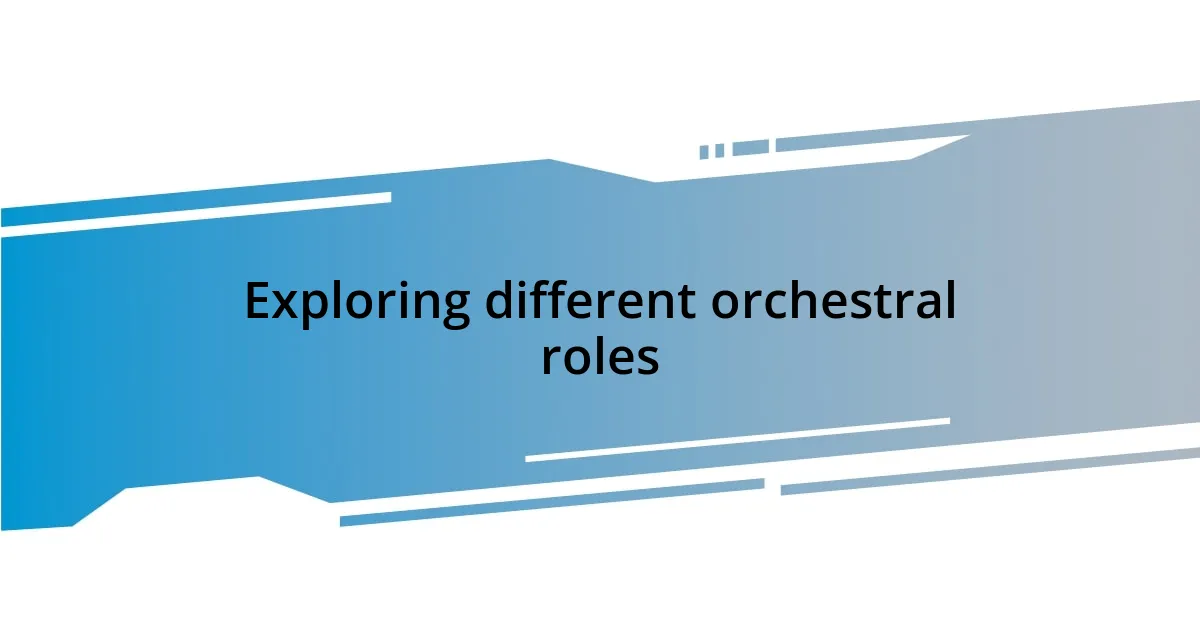
Exploring different orchestral roles
Exploring the various roles within an orchestra can be a thrilling experience. Each position, from the first violin to the timpanist, offers unique challenges and rewards. I recall my first time watching a conductor lead a rehearsal. The way they shaped the music, bringing it to life with their gestures, was mesmerizing. It made me consider how essential a conductor is to the overall performance. Have you ever thought about how the dynamic nature of orchestration creates a layered musical experience?
As I tried out different roles—such as playing in a brass section or taking on chamber music—I discovered the camaraderie that comes from working with diverse musicians. Playing in a string quartet allowed for a more intimate connection, where each note felt like part of a conversation. Conversely, the booming sound of the brass section during a climactic moment in a symphony showcased the power of teamwork. What’s interesting is that these experiences taught me about the importance of adaptability in the musical landscape. Each role offered a new perspective on how to contribute to the collective sound.
Furthermore, I found that understanding orchestral roles goes beyond playing notes—it’s about embracing the essence of collaboration. There’s something magical that happens when all sections unite, creating a rich tapestry of sound. I once participated in a performance of Mahler’s Fifth Symphony, and the overwhelming emotion radiating from the orchestra was incredible. It reminded me that every role, big or small, plays a vital part in conveying the music’s message. Isn’t it amazing how every musician’s contribution weaves together to tell a larger story?
| Orchestral Role | Key Characteristics |
|---|---|
| Conductor | Leads and interprets the music, coordinating all sections |
| First Violin | Often plays melody, sets the tone for the string section |
| Timpanist | Provides rhythmic support with powerful percussive sound |
| Brass Section | Brings strength and brilliance, often highlights climactic moments |
| Woodwind Section | Adds color and intricacy with their diverse range of timbres |
| Strings | Creates the emotional backbone of the orchestra with harmony and melody |

Networking with other musicians
Networking with other musicians has been one of the most enriching parts of my journey. I distinctly remember attending a local music festival where I struck up conversations with fellow musicians. We shared our experiences, exchanged contacts, and even collaborated on a few impromptu jam sessions. This kind of interaction opened doors for me, leading to new opportunities that might not have surfaced otherwise. I often wonder how many hidden connections lie just beyond our casual encounters.
To build a meaningful network, consider these strategies:
- Attend concerts and workshops: Immerse yourself in environments where musicians gather. You never know who you might meet!
- Engage online: Social media platforms and musician forums offer great spaces to connect and share ideas.
- Join local music communities: Being part of a community orchestra or music group creates a sense of belonging and fosters connections.
- Offer to collaborate: Proposing joint projects or performances can be a fantastic way to strengthen your relationships.
- Help others: Sharing resources or providing assistance to fellow musicians establishes goodwill.
It’s a wonderful feeling to watch your network grow, as it leads to not just professional growth, but also deeper friendships. Each connection I made, whether through a casual meetup or an organized event, contributed to my niche in orchestras. The piano player I met at a late-night session? She became a longtime collaborator. These moments remind me that networking is about building relationships grounded in shared passion.

Gaining experience through auditions
Gaining experience through auditions was a game changer for me. I vividly remember my first orchestral audition; my heart raced as I flipped through the sheet music, filled with excitement and fear all at once. Each audition pushed me to refine my skills under pressure. Have you ever experienced that mix of adrenaline and anticipation? It’s a unique feeling that really brings your musicianship to the forefront.
As I participated in various auditions, I learned to navigate the nuances of the selection process. One time, I landed a spot in a regional orchestra purely because I embraced an unconventional interpretation during my audition. The judges noticed my passion and creativity, which highlighted the importance of being true to myself. I began to realize that it’s not just about hitting all the right notes—sometimes, it’s about telling a story through the music.
Auditions also taught me valuable lessons in resilience. After facing rejection from a prestigious orchestra, I felt discouraged, but that experience fueled my determination. It pushed me to seek feedback and improve continuously. Looking back, I can appreciate how that rejection shaped my journey, giving me the grit to pursue more opportunities. Isn’t it fascinating how each audition, regardless of the outcome, contributes to our growth?

Evaluating your skills and interests
Evaluating your skills and interests is a crucial step in finding your place within the orchestral world. When I took the time to reflect on my strengths, I uncovered hidden talents I didn’t even realize I had. For instance, I always crafted interesting arrangements for pieces I loved, which sparked my interest in composition. Have you ever paused to think about what you truly enjoy doing? Sometimes, it’s those overlooked passions that can lead us to our niche.
Back in my early days, I created a simple chart listing my skills and interests side by side. This visual representation was eye-opening! It was clear that my experience in playing multiple instruments opened up unique opportunities to collaborate with different sections in an orchestra. I noticed how my enthusiasm for orchestral textures could impact my contributions. Have you ever made a list like that? I found that it not only clarified my path but also energized me to pursue those interests more intentionally.
Understanding how your skills align with your interests can also guide your decisions moving forward. When I discovered that I thrived in leadership roles during group projects, it inspired me to volunteer as a section leader in my local orchestra. The responsibilities thrilled me, and it was satisfying to nurture the growth of my peers. Do you know where your strengths lie? Taking the time to evaluate these aspects not only solidifies your direction but can also lead to unforeseen joy in the journey.
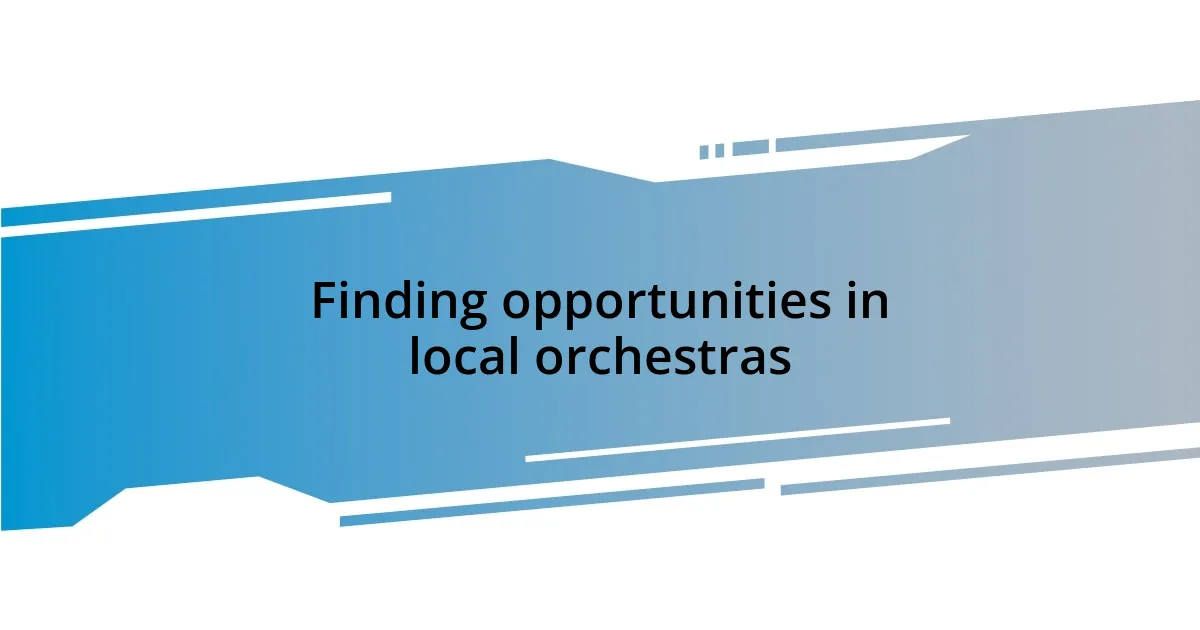
Finding opportunities in local orchestras
Finding opportunities in local orchestras can truly open doors you never expected. When I first sought orchestral positions, I was surprised at how many community ensembles were around me. I remember attending a local concert and chatting with some musicians afterward. They were incredibly welcoming, and many encouraged me to audition for their group. Have you ever thought about the connections you might be missing right in your own backyard?
Networking became a valuable asset in my journey. In one memorable instance, a friend I met at a chamber music workshop told me about an opening in an orchestra looking for someone who could play both strings and winds. I had hesitated to take on gigs outside my primary instrument, but hearing her words lit a fire in me. I decided to embrace that challenge, which not only led to an audition but also helped me realize the versatility I could bring to different orchestral settings. Isn’t it revealing how a simple conversation can lead to unexpected opportunities?
Moreover, I found that many local orchestras were eager to include passionate musicians, regardless of experience. One summer, I volunteered at a youth program hosted by my local orchestra, which allowed me to both learn from established musicians and share my love for music with younger players. That experience not only deepened my appreciation for orchestral work but also solidified my presence in the community. Have you taken the time to volunteer or give back? It turns out that nurturing others can enrich your own journey in remarkable ways.

